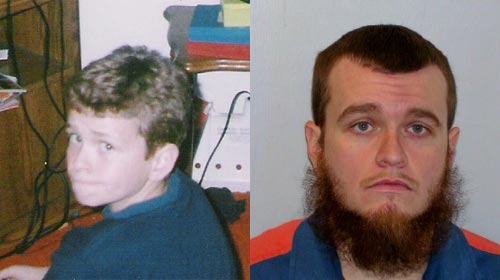
Matthew Bentley was 14 years old in 1997 when he broke into a house he thought was unoccupied. While rummaging for valuables, he was confronted by the owner. Matthew shot and killed her with a gun he found in the house. At the time of his crime, Matthew couldn't legally smoke, drive or join the military, but he would receive a mandatory adult sentence т life without the possibility of parole. In a new podcast, you can listen to Matthew tell his own story. (Bentley is pictured above before he was sentenced to life in prison without parole (left), and today.)
During Matthew's trial, the judge, according to Michigan law, was not allowed to consider his age, capacity for rehabilitation or his tough home life т Matthew's father and older brother were both in jail for molesting his siblings.
Matthew has been in an adult prison since his sentence and will likely die there, unless the courts or our legislature act to put an end to sentencing schemes that ignore the capacity for change and rehabilitation in children and throw away the key. The question of whether it's constitutional to imprison teenagers for the rest of their l lives for murders committed when they were children will be argued before the Supreme Court today in two cases from Alabama and Arkansas.
Meanwhile, the РЯАФУХПЊНБНсЙћ's case on behalf of Matthew and 12 others challenging what one client called their "slow death penalty" moves forward in federal district court in Michigan.
These cases tell the stories of children often forgotten, failed or forced into incredible circumstances by adults. They tell stories about mistakes made and a system that refuses to give children a second chance. They tell stories in which children are sentenced to die in prison.
Michigan incarcerates the second highest number of people serving life sentences without parole for crimes committed when they were younger than 18. Children as young as 14 in our state can be tried as adults and sentenced to mandatory life without parole. They will never be looked at again т not at 20 years old, 30 years old or 60 years old. There are more 2,500 individuals serving such sentences across the country, including more than 350 in Michigan.
Although the wheels of justice move slowly, there is evidence that our criminal justice system is waking up to the fact that juveniles should be treated differently than adults. Fourteen states already refuse to sentence children to life in prison and, last year, the United States Supreme Court ruled that it's cruel and unusual punishment to sentence children convicted of non-homicide crimes to a life behind bars without the possibility of parole. Hopefully, it will now find that even in cases where children are convicted of murder, they must be given the chance to rehabilitate themselves and possibly one day earn parole.
The U.S. is the only country in the world that sentences children to life without parole, but it's not too late for our nation, and our state, to join the growing chorus of countries, advocates and international bodies calling for compassion and a second chance for our kids.
Learn more about juvenile life without parole: Sign up for breaking news alerts, , and .


